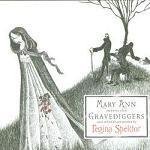
Regina Spektor Mary Ann Meets the Gravediggers
(Transgressive)
Once upon a time, there was a girl called Regina. She was very beautiful with tight curls of auburn hair and shining bright eyes. Everyone adored her and not just people, the spirits and faeries of Russia, her homeland, loved Regina as well and blessed her with an ability to play the piano and all manner of other musical instruments. In fact, Regina could even make a stick and chair into a musical instrument.
Regina moved from Russia to New York where she was taught to play the classical piano, and play it very well she did. She would work very hard until she could play even the most difficult part. But she also wrote poetry, and strange poetry it was. Her poetry was at once both bright and dark and both funny and sad, and was peopled with sailors and gravediggers and cursers and the cursed.
One day, a friend suggested Regina should put her poetry to piano music. At first Regina didn't think this was possible, "I can't put my poetry to music, music is written by other people for concertos and recitals". But then she tried it. "I can put my poetry to music", she realised. And so Regina became a songwriter. She worked hard and travelled around New York and the area playing the piano and singing songs about lovers and unhappy mothers, and sons who loved their mothers too much, and songs about women who would rather ride a limousine than pay for lifesaving chemo, and naturally she wrote songs about gravediggers.
After a while, she made a record, which she sold at her shows in New York and thereabouts. And people liked her record. So she made another one, and then another. And when she had made the third record, people realised that she was so good, people all around the world would want to hear her record. And so, Soviet Kitsch was given to the people of Britain in 2004. And Regina came to Britain and played to the people there, and like the people in New York and the spirits and the faeries who blessed her as a babe, the people of Britain loved her. They loved her old songs too, but couldn't get them (except streamed on the internet).
Regina had made friends with two young men at a record label in the British village of London who said, "Regina, why not make a compilation of your first three albums for the people of Britain, they will love that?" And so, the girl with tight curls from Russia released a selection of songs, some of which were written when she was young and some after she had grown up a bit. They told old stories and new stories, and some were childish and naïve, and some with Dr Seuss like efficiency could sum up a character using only about twenty different words. The best songs were as good as anything people had heard for a very long time and the worst songs were all part of Regina, and that, as we know by now boys and girls, is one of the most loveable things in the world.
Not everyone liked Regina; some people were too cynical, or too old in the head, or too into men with beards and loosely strung guitars to appreciate her knowingly innocent charms. But that was their loss, because Regina and the people who liked her lived happily ever after. And everyone else decided that they quite liked Dido really and bought a coffee table.
4 May, 2006 - 22:00 — Peter Hayward